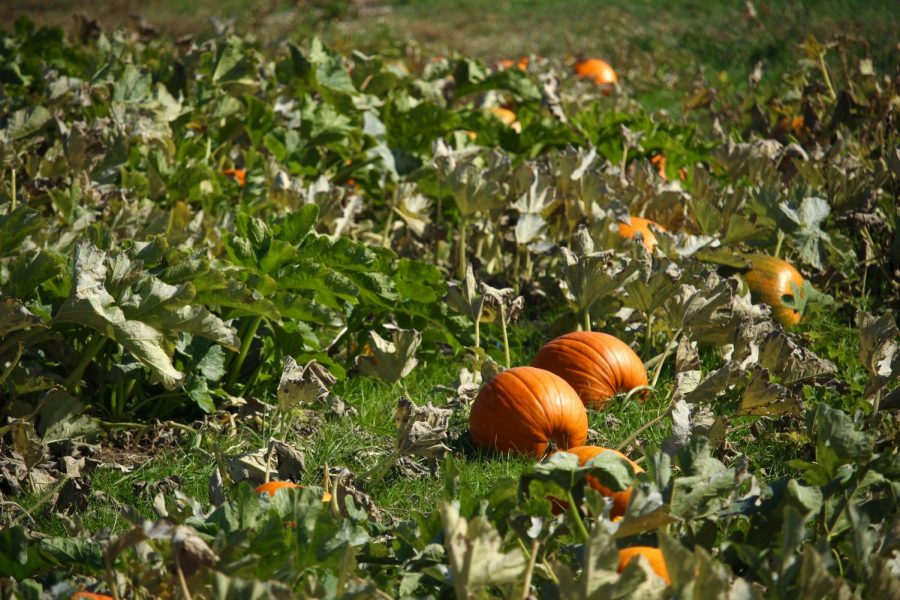Wildcat Neighborhood kicks off fall
October 2, 2019
This summer, food grew right out of CWU’s backyard and was served on plates, fresh as a farm-to-table meal can be.
At Wildcat Neighborhood Farm, located on East Dean Nicholson Boulevard across from Student Village, loads of crops sprouted from the once-empty ground.
After starting its pilot season five months ago in May, the farm had an abundant summer harvest, from okra, carrots, beets and radishes to kale, cucumber, squash and more.
Approximately 1000 pounds of produce were sent to CWU Dining Services and about 200 pounds more were donated to FISH Food Bank and Presidents United to Solve Hunger (PUSH) pantries.
On Sept. 27, the farm hosted a kick-off event to allow people to come and see its progress and find out how they can get involved.
Farm and Sustainability Manager Kate Doughty led a group of about a dozen people on a tour of the farm, showing them the high tunnels, the compost piles, the pumpkin and melon patches and the crop field.
“I was surprised at how well things grew, given that this land was totally empty before,” Doughty said. “It’s really cool to see the changes happen, sometimes it feels like you look at something and it’s just barely sprouting, and you look again and it’s giant.”
Attendees got to experience some hands-on farm work like shucking corn husks and cutting melons off the vines.
They also received merchandise such as stickers and pins and got to guess how much a toddler-sized zucchini weighed. The winner who guessed the closest to the answer, which was 14.6 pounds, received a goodie bag of fresh produce.
Everyone else was also given the chance to pick some veggies and herbs from the crop field, like Swiss chard, basil and collard greens.
Joe Ritchie, the Campus Executive Chef at Dining Services, served soup made from pumpkin, delicata and Kabocha squash and grilled corn, which were all grown on the farm.
Ritchie said that over the summer, Dining Services used many of the vegetables and herbs grown here.
“[The farm] grew a ton of basil,” Ritchie said. “So we made huge batches of pesto, froze them and thawed it whenever we needed some.”
Ritchie said Dining Services will move in a more sustainable direction when providing single-use items like napkins and tableware.
“At Northside Commons, everything is served in compostable ware, same thing at Panda Express,” Ritchie said. “We’re moving into it, bit by bit.”
Doughty said that supporting local farms is also a way to help the environment.
“A lot of our food travels many miles, hundreds if not thousands of miles, to get to our plates and the emissions from that make a big impact,” she said. “Local food doesn’t have to travel as far to get to us, regardless of how it was produced.”
By next year, when the high tunnels are operating, Doughty said they will plant crops more intentionally so that Dining Services will be able to use them for fall and winter quarters.
To prep for the falling temperatures, she said they will get the field all cleaned up, get the summer crops out, and “hopefully the fall crops will survive the [frost].”
Doughty said there is still much to do to try to make large-scale composting happen and to prepare the yield for next summer.
To get involved, she said, “You can just show up, no experience necessary, just interest and enthusiasm and curiosity.”
Volunteer hours can be found on the website but Doughty said the best way to get updates is to follow the farm on Instagram or Facebook, in case volunteer hours get cancelled.
Madelyn Dickens, a student majoring in French and minoring in environmental studies who attended the kick-off event, said she plans to volunteer at the farm.
“In Spokane, I really liked working on farms during the summer and sustainable farms became a huge interest of mine,” Dickens said. “A lot of people don’t know about [the farm], but it needs volunteers, it needs help and it needs a community.”


